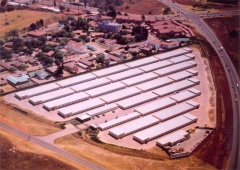

|
Case
study Prof. Ian Giddy, New York University qUbuntu
Properties is the largest independent owner-operator of high-security
self-storage facilities in the greater Durban area of South Africa. The
Ntshona family opened its first self-storage complex in
Pietermaritzburg in
1997 and now has facilities throughout downtown Durban and nearby
residential areas. The business is modelled on a U.S. storage
management
company, Shurgard Storage, based in California.
In a region subject to a high theft rate, Ubuntu's selling point was its reputation for tight security. The company advertises that: "The entire premises are alarmed (motion sensors in all internal areas and intrusion detectors on all access doors). These sensors and detectors are connected directly to ADT Armed Response Security via radio alarm and telephone line. All entrances are secured with steel security gates and locked with VIRO Insurance Locks. In addition, access to the building is controlled via a security guard posted at the entrance gate. As a result, our clients never suffer a loss -- we guarantee it."  Sisa
Ntshona, Chairman and CEO of Ubuntu, is considering options for a
change in
the company's financial structure. He is in discussions with two banks
about borrowing additional funds based on the security of the real
estate and the company's cash flow. Since the company now has good
stable prospects, he’s considering raising funds for the acquisition
and construction of new storage complexes throughout South Africa. The
country's middle class is growing rapidly, and many small businesses
required secure storage space. At a recent seminar, Sisa learned of the
"leveraged roll-up" technique. This involved the acquisition and
consolidation of fragmented but similar businesses in a geographical
market, where combined purchasing power, back-office billing and
administration, and common marketing would yield cost savings and sales
growth. Sisa
Ntshona, Chairman and CEO of Ubuntu, is considering options for a
change in
the company's financial structure. He is in discussions with two banks
about borrowing additional funds based on the security of the real
estate and the company's cash flow. Since the company now has good
stable prospects, he’s considering raising funds for the acquisition
and construction of new storage complexes throughout South Africa. The
country's middle class is growing rapidly, and many small businesses
required secure storage space. At a recent seminar, Sisa learned of the
"leveraged roll-up" technique. This involved the acquisition and
consolidation of fragmented but similar businesses in a geographical
market, where combined purchasing power, back-office billing and
administration, and common marketing would yield cost savings and sales
growth. One possibility under consideration was to acquire several storage businesses in East London and Port Elizabeth, for an estimated cost of 10 million rand. Operating profit ratios at these businesses were at least as good as Ubuntu's. In a cash-flow business, Sisa hoped, much of this growth could be financed with debt. The company already has senior secured debt of 19 million South African Rand (ZAR). Ubuntu's banks have suggested that if the company borrowed up to ZAR5m more, the cost of debt would rise by 1.5%, or by 3% if more tham 5m. The borrowing rate is now 8.25% p.a. The book value of the company’s assets is ZAR24 million. Ntshona has had a professional estimate of the replacement value, and it was ZAR28 million. While his company is private, the market value of other companies in the industry was 2x book value of equity, or more. Sisa has discussed his goal of tripling or quadrupling the company's size with the eventual goal of going public – which he hopes to do by converting Ubuntu into a Property Loan Stock Company, the South African equivalent of a REIT. Until then, however, Ntshona is unwilling to issue additional common stock or otherwise dilute his family's control. He has asked your advice, and provided the following information. Currently the company has debt of ZAR19m
Management estimates EBIT this year at ZAR8.1m, and EBITDA
at ZAR9.3m, on turnover of ZAR46m.
Based on this business, the banks' minimum EBIT interest
coverage ratio is 2.7
Currently SA government bonds yield 6.50%
The estimated beta from comparables is 1.7
The SA stock market "risk premium" is estimated at 4.50%
The estimated value of the physical assets is ZAR28m
The future growth rate is about 6.00% per annum
The
firm's marginal tax rate is 30%
Questions 1. How would you measure Ubuntu's existing leverage? 2. How much additional debt can the company afford to take on? 4. Would sale-and-leaseback financing be a possibility? 4. What other forms of financing might be available? |